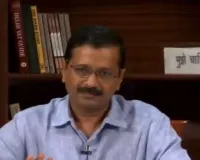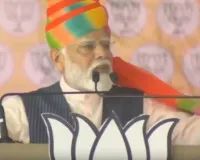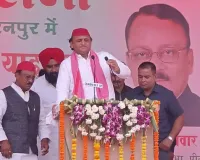
Why Does Statute Not Say In Clearer Terms Only Parliament Has Power To Impose Tax On Minerals: SC
New Delhi: The Supreme Court on Tuesday asked the Centre as to why the statute does not say in clearer terms that only Parliament has the power to impose tax on minerals and states are denuded of authority to levy such exaction. A nine-judge bench headed by Chief Justice DY Chandrachud asked Solicitor General Tushar Mehta, appearing for the Centre, whether his contention that the Union fixes taxes on minerals to bring uniformity impinges upon the federal distribution of power enshrined in the Constitution.
"Why does the statute not say that this is the tax that the Union will be charging and to that extent the power of state is denuded or something like that? Why do you have to say this by inference?" the bench, also comprising Justices Hrishikesh Roy, Abhay S Oka, BV Nagarathna, JB Pardiwala, Manoj Misra, Ujjal Bhuyan, Satish Chandra Sharma and Augustine George Masih asked.
Mehta said in his submissions that the entire architecture of the Mines and Minerals (Development and Regulation) Act (MMDRA) is the limitation on the states' legislative power to impose tax on minerals. "If such tax is imposed, it would be invalid or unconstitutional tax. There is an in-built statutory mechanism which says that this will be the amount and nothing morePre India Cement verdict (1989 judgement), some states had levied 300 per cent royalty on mineral rights tax and some had levied 500 per cent tax on royalty. To bring uniformity, the Centre fixes the rate of tax," he submitted.
CJI Chandrachud told Mehta this submission may have implications for the federal system. "It is a desirable argument that for uniformity in taxes the Centre can fix the taxes and it is a matter of policy. But the question is whether this will impinge upon the federal distribution of power under the Constitution," the CJI said.
He said under Entry 53 of List 2 (state list), states can levy taxes on the sale and consumption of electricity and the same goes for natural gas under Entry 54 of List 2. "This is the scheme of our Constitution that different states can impose different taxes on consumption of electricity or in the case of natural gas or petroleum products. The uniformity argument can be applied here also and it may impinge upon the federal scheme of things. There is nothing like sui generis (unique) about minerals that there has to be uniformity," CJI Chandrachud told Mehta.
The solicitor general said in case of minerals there is no other entry like Entry 50 of List 2 of the Constitution which says it is subject to any limitations imposed by Parliament by law relating to mineral development. The CJI said Parliament, at the most, can impose limitations like the tax cannot exceed a particular amount and there can be different limitations for different minerals.
Mehta said, "MMDRA is the restriction which the Constitution says is the limitation and it is sui generis for the simple reason that there is no other entry which says subject to the limitation. "At the outset, it is necessary to clarify that the present matter does not raise any issue of a fiscal tussle between Centre on one hand and the states on the other as has been tried to be portrayed by the other side. Parliament has only vested the power of fixation of royalty...with the central government."
He added the actual flow of benefits or exactions of any nature goes directly to states and the Union only fixes the rate of royalty for uniformity and not a single rupee is retained. Mehta asserted, "Under Section 9 of the MMDRA, the central government has the power to fix royalty". He said the fixation of rates by the Centre is not a unilateral but cooperative process involving the states, while also considering the supervening objective of mineral development in public interest, keeping the nation as an unit. The hearing remained inconclusive and would continue on Wednesday.
The nine-judge constitution bench is considering the vexed question as to whether the royalty collected by the Centre on mining leases can be considered as tax, as held by a seven-judge bench in 1989. On March 6, the top court said the Constitution does not give Parliament the "entire universe" of mineral development and states also have powers to regulate and develop mines and minerals.
On February 27, the top court had commenced hearing the vexed issue of whether the royalty payable on minerals extracted, as provided for under the MMDR Act, 1957 is in the nature of tax. The issue arose after the 1989 verdict in the case of India Cements Limited versus State of Tamil Nadu wherein a seven-judge bench of the apex court held that royalty was a tax.
However, a five-judge bench of the apex court ruled in 2004 in the State of West Bengal versus Kesoram Industries Limited case that there was a typographical error in the 1989 verdict and that royalty was not a tax. The dispute was then referred to a larger nine-judge bench. The top court is hearing a batch of 86 appeals filed by mining companies, public sector undertakings (PSUs) and state governments arising from conflicting verdicts passed by different high courts on the issue.
About The Author

Related Posts
Post Comment
Latest News
 Flight Attendant Indicted In Attempt To Record Teen Girl In Airplane Bathroom
Flight Attendant Indicted In Attempt To Record Teen Girl In Airplane Bathroom











Comment List